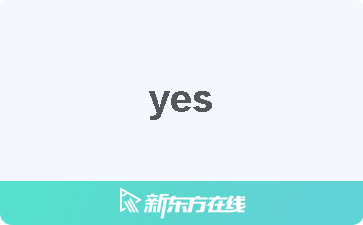yes

1. 是的(用以对问题作肯定回答)
You use yes to give a positive response to a question.
双语例句
例:'Are you a friend of Nick's?'—'Yes.'
“你是尼克的朋友吗?” “是的。”
例:'You actually wrote it down, didn't you?'—'Yes.'
“你实际上把它写下来了,不是吗?” “是的。”
2. 好的(用以接受提议、要求或给予许可)
You use yes to accept an offer or request, or to give permission.
双语例句
例:'More wine?'—'Yes please.'
“再要点儿葡萄酒?” “好的。”
例:'Will you take me there?'—'Yes, I will.'
“你带我去那儿吗?” “好的,我会的。”
3. 对(用以告诉某人他所说的是正确的)
You use yes to tell someone that what they have said is correct.
双语例句
例:'Well, I suppose it is based on the old lunar months, isn't it?'—'Yes, that's right.'
“嗯,我想它是基于旧的阴历月份的,不是吗?” “对,是那样的。”
4. 请讲 , 请进(用于表示准备好或愿意跟想跟自己说话的人说话)
You use yes to show that you are ready or willing to speak to the person who wants to speak to you, for example when you are answering a telephone or a knock at your door.
双语例句
例:He pushed a button on the intercom. 'Yes?' came a voice.
他按了对讲机的一个按钮。“什么事?”传来一个声音。
5. (用以表示同意、接受或理解前一说话者的话)是的
You use yes to indicate that you agree with, accept, or understand what the previous speaker has said.
双语例句
例:'A lot of people find it very difficult indeed to give up smoking.'—'Oh yes. I used to smoke three packets a day.'
“许多人发现戒烟确实很难。” “噢,是的。我过去1天抽3包。”
6. (用以鼓励某人继续说)嗯哼
You use yes to encourage someone to continue speaking.
双语例句
例:'I remembered something funny today.'—'Yes?'
“我今天想起件有趣的事。” “是吗?”
7. 不错(后接but,礼貌地引出反对意见)
You use yes, usually followed by 'but', as a polite way of introducing what you want to say when you disagree with something the previous speaker has just said.
双语例句
例:'She is entitled to her personal allowance which is three thousand dollars of income.'—'Yes, but she doesn't earn any money.'
“她享有的个人所得免税额为3000美元。” “不错,不过她根本不挣钱。”
8. 不(用以说明前一说话人的否定陈述或问题是不正确或不真实的)
You use yes to say that a negative statement or question that the previous speaker has made is wrong or untrue.
双语例句
例:'That is not possible,' she said.—'Oh, yes, it is!' Mrs Gruen insisted.
“那是不可能的,”她说。—“哦,不,那是可能的!”格伦太太坚持道。
9. 是吗(用以暗示不相信或不同意前一说话人的话,尤用于想表达厌烦时)
You can use yes to suggest that you do not believe or agree with what the previous speaker has said, especially when you want to express your annoyance about it.
双语例句
例:'There was no way to stop it.'—'Oh yeah? Well, here's something else you won't be able to stop.'
“没法阻止它。” “哦,是吗?那么,这儿还有别的你无法阻止的事。”
10. (表示忘了某事又刚想起来)对了
You use yes to indicate that you had forgotten something and have just remembered it.
双语例句
例:What was I going to say. Oh yeah, we've finally got our second computer.
我想说什么来着?噢,对了,我们终于有了第二台电脑。
11. 没错(用以强调并确认所作的陈述)
You use yes to emphasize and confirm a statement that you are making.
双语例句
例:He collected the $10,000 first prize. Yes, $10,000.
他获得了奖金为1万美元的一等奖。没错,1万美元。
12. 说不好(用以作不可断言是或不是的回答)
You say yes and no in reply to a question when you cannot give a definite answer, because in some ways the answer is yes and in other ways the answer is no.
双语例句
例:'Was it strange for you, going back after such a long absence?'—'Yes and no.'
“那么长时间不在,然后又回来,你会觉得陌生吗?”“不好说。”
CONVENTION. 习惯表达

关注新东方在线考雅课程中心
免费获取雅思备考资料包
雅思口语题库
扫码添加助教回复【口语题库】免费领取


 资料下载
资料下载
 公开课
公开课 编辑推荐
编辑推荐